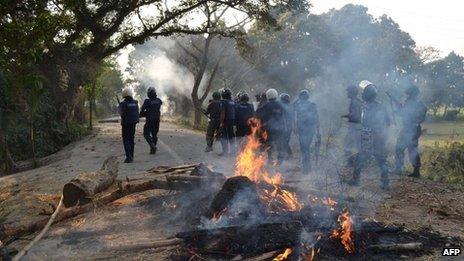Bangladesh war crimes verdict sparks more violence
- Published

Protesters clashed with police for a second day, after a senior Islamist party leader was sentenced to death by a special war crimes tribunal.
Delwar Hossain Sayeedi was found guilty on Thursday of charges including murder, rape and torture during the war of independence in 1971.
At least 40 people have been killed as deadly clashes swept the country after the verdict was announced.
Sayeedi's Jamaat-e-Islami party says the tribunal is biased against it.
The party was opposed to Bangladeshi independence but denies any role in war crimes committed by pro-Pakistan militias. Official estimates say more than three million people were killed in the war.
'Serious crisis'
Thursday's violence saw confrontations between the police and Jamaat supporters across the country and was the worst day of political violence in Bangladesh in decades, reports the BBC's Anbarasan Ethirajan from Dhaka.
But on Friday clashes broke out in the northern districts of Gaibandha and Chapainawabganj between pro-Jamaat protesters party and supporters of the governing Awami League. Police say two died in the clashes.
Jamaat had also called for demonstrations in the capital Dhaka after Friday prayers but authorities responded by deploying a heavy security presence.
Khaleda Zia, Bangladesh's main opposition leader, criticised what she called government "brutality".
"The way the government is pushing the country towards a serious crisis, the way they are indulging in mass killing, as a responsible opposition, we cannot remain silent.
"I call upon my countrymen to come out on the streets. We will not tolerate a single more shooting. We will resist them with the help of the people," she said on Friday.
Ms Zia said her Bangladesh National Party (BNP) would hold a general strike on Tuesday, and called for the police not to obey what she called unjust government orders.
Jamaat - who are political allies of the BNP - have also called for strikes on Sunday and Monday in response to Sayeedi's sentencing.
War crimes tribunal
Recent weeks have seen a series of large and angry protests by anti-Jamaat protesters demanding the execution of Islamist leaders sentenced by the tribunal.
News of the death sentence on Sayeedi was met with jubilation by some demonstrators on the streets.
Sayeedi is the third person to be convicted by the tribunal so far, and the most senior. It is trying a total of nine Jamaat leaders and two members of the BNP.
Sayeedi was accused of working with the al-Badr group during the independence struggle and carrying out numerous atrocities, including forcibly converting Hindus to Islam.
His critics say that during the war, he formed a small group to loot and seize the property of Bengali Hindus and those who supported independence.
Earlier this month, another Jamaat leader, Abdul Kader Mullah, was sentenced to life for crimes against humanity.
In January, former party leader Abul Kalam Azad was found guilty in absentia of eight charges of crimes against humanity and sentenced to death.
The special court was set up in 2010 by the current Bangladeshi government to deal with those accused of collaborating with Pakistani forces who attempted to stop East Pakistan (as Bangladesh was then) from becoming an independent country.
But human rights groups have said the tribunal falls short of international standards.
- Published5 February 2013
- Published15 February 2013
- Published21 January 2013
- Published4 September 2016
- Published21 January 2013
- Published26 February 2019